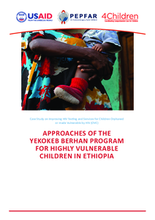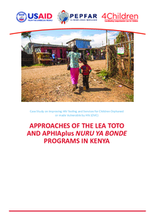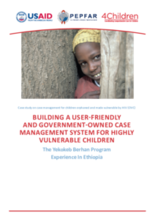Displaying 281 - 290 of 510
In this case study, Coordinating Comprehensive Care of Children (4Children) documents and evaluates the work of Pact's Yekokeb Berhan Program for Highly Vulnerable Children in Ethiopia.
In this case study, Coordinating Comprehensive Care of Children (4Children) documents and evaluates the work of COGRI’s Lea Toto program and the FHI360 led APHIAplus program in Kenya.
This study aimed to test the effectiveness of life skills education (LSE) and psychoeducation in the reduction of Youth Self Report (YSR) scores on institutionalized children in Kenya, using structured activities supported by trained facilitators.
This article presents the findings from the Mind Your Health study conducted in Northern Ireland, which analyzes the experiences of young people in care and their carers in accessing and engaging in mental health services.
This article examines the impact of poverty on looked-after children and their families, describes and evaluates the use of multiple family group therapy and other family-based interventions, and reports children's experiences and feedback from the groups.
This article describes and evaluates a model utilizing Child-Parent Psychotherapy (CPP) to minimize the impact of early trauma for infants and toddlers removed from parental care.
This case study describes the coordinated care and case management system for highly vulnerable children and their caregivers implemented by the Yekokeb Berhan program in Ethiopia.
The goal of this study is to describe the population treated in therapeutic residential care (TRC) facilities in Spain and the therapeutic coverage given.
This study employed event-related potentials (ERPs) to examine the neural correlates of facial emotion processing in 12-year-old children who took part in a randomized controlled trial of foster care as an intervention for early institutionalization.
This study explored the experiences of adoptive parents who chose to place their intercountry adopted child in out-of-home care due to the child's disability.



